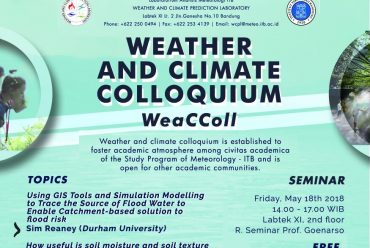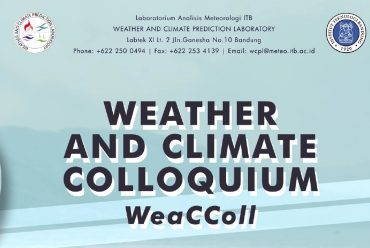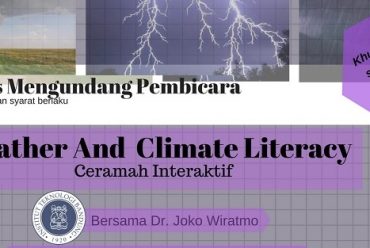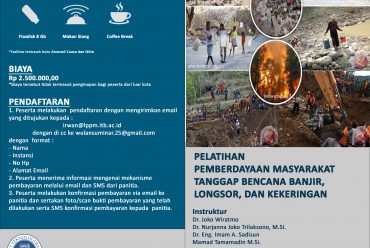RESILIENT COASTAL AQUIFER MANAGEMENT: ACADEMIA’S ROLE AND COLLABORATIVE ACTION
Opening Ceremony of the 7th Annual PAAI Meeting & 8th APCAMM
Bandung, August 5, 2025
Distinguished keynote speakers and panelists,
Honored representatives of government institutions, universities, NGOs, and the private sector,
Dear colleagues and participants,
Assalamu’alaikum warahmatullahi wabarakatuh,
Good morning and welcome to Bandung,
I want to express my gratitude for the presence of our founding fathers and senior advisors—whose legacy continues to inspire us. Allow me to acknowledge:
**Prof. Sudarto Notosiswoyo, Prof. Lambok M. Hutasoit, Prof. Denny Djuanda Puradimaja (Prof. DJP), Prof. Heru Hendrayana, Prof. Hendarmawan, and Prof. Lilik Eko Widodo (LEW)—**whose pioneering work laid the foundation for this association.
We also express appreciation to our colleagues from the Geological Agency and the Ministry of Energy and Mineral Resources (ESDM) with Dr. Ir. Muhammad Wafid A.N., M. Sc. As the Head of the Geological Agency as the representatives. And, Prof Adrian Werner from Flinders University – Australia, Ms. Fainta Negoro as Chief Impact & Sustainability Officer at Jejakin -Founder at Jaga Semesta, and Mr. Agathon Chandra from Bumi Suksesindo Representative as todays presenters for panel discussion. We are also grateful for the active participation of so many stakeholders in this meeting—including representatives from BRIN, the Ministry of Public Works, KLHK, and others, as well as participants from national and international universities, NGOs, professional organizations, and industries. And we would like to thank more than a hundred participants from more than 40 different institutions, from students and professionals, with more hundred paper and presenters, had participated. Representatives from 10 countries were also present, including Vietnam, Hong Kong, Malaysia, Australia, Brunei Darussalam, China, the Netherlands, Saudi Arabia, South Korea, and Indonesia.
It is a great honor for Institut Teknologi Bandung (ITB) to host the 7th Annual Meeting of the Indonesian Groundwater Expert Association (PAAI) and the 8th Asia-Pacific Coastal Aquifer Management Meeting (APCAMM). We thank the organizing committee and the participating institutions for entrusting us with this responsibility.
This joint meeting offers a meaningful opportunity for ITB to strengthen collaboration with national professional organizations through PAAI and the broader international community through APCAMM. This spirit of connectedness is critical as we work collectively toward resilient and sustainable water management systems.
ITB believes universities play a vital role in advancing groundwater resilience through research, education, and leadership development. With over 99,000 km of coastline, Indonesia’s coastal aquifers are uniquely dynamic and offer valuable lessons for other regions in the Global South. Addressing groundwater and climate challenges demands strong interdisciplinary collaboration. We must link geoscience with engineering, policy, economics, and social systems. Cross-border and cross-sector partnerships are essential to ensure real-world impact. At the same time, we must invest in young scholars and early-career researchers. Field education, international exchanges, and joint research are powerful tools to prepare them for future challenges. Their engagement will be critical for ensuring water security across the Asia-Pacific region and beyond.
Academia’s Role in Advancing Groundwater Resilience
Dear participants
Tropical coastal aquifers face mounting pressure from sea-level rise, changing rainfall, and urban expansion. Indonesia, with its vast coastlines, experiences firsthand how overextraction leads to subsidence and salinity. Universities play a vital role in generating science-based strategies to manage these challenges. At ITB, field studies and modeling help us understand the dynamics of pumping, recharge, and saltwater intrusion. These insights contribute to national understanding of aquifer overuse, especially in urban areas like Jakarta and Semarang. Universities also shape future groundwater managers through hands-on education and applied research. ITB students and faculty engage directly in nationwide monitoring and modeling projects. Many alumni continue this work in government and industry, amplifying academia’s influence. Equally important is translating science into policy. ITB researchers partner with agencies like BRIN and the Geological Agency to develop practical management tools. These efforts support national resilience strategies and inform regulations. Moreover, Indonesia’s coastal aquifer studies have global relevance for other groundwater-dependent regions. Lessons on balancing surface and groundwater use or controlling intrusion can benefit coastal megacities worldwide. Through education, research, and community engagement, universities create lasting foundations for groundwater resilience.
Interdisciplinary Collaboration for Policy-Relevant Solutions
Dear Ladies and Gentlemen
Coastal aquifer challenges sit at the intersection of multiple disciplines—including hydrogeology, geotechnical engineering, urban planning, climatology, environmental economics, law, and public policy—making integrated approaches essential. These interconnected systems cannot be addressed by one field alone but require collaborative problem-solving that brings diverse expertise to the table. Universities, as hubs of knowledge production and innovation, have a responsibility to connect science with practice and ensure that research informs decisions on the ground. Academic research should not only model aquifer behaviour but also guide sustainable water use, infrastructure planning, and institutional regulation. This calls for sustained science–policy dialogue, where researchers and policymakers engage closely to translate models and data into effective governance tools.
Events like APCAMM are critical because they create structured spaces for interdisciplinary exchange across national and professional boundaries. These regional platforms allow engineers, scientists, economists, and water managers to share knowledge, align priorities, and co-develop actionable strategies. Such collaboration helps bridge the gap between academic insight and real-world implementation, especially in regions vulnerable to groundwater stress. By institutionalizing interdisciplinary partnerships and supporting joint initiatives, we can amplify impact and create more adaptive and equitable management systems. In the end, only by combining natural sciences, engineering, social sciences, and policy can we generate resilient solutions for coastal aquifers under pressure.
Empowering Students and Early-Career Researchers
Dear college
A lasting response to coastal groundwater challenges must involve the next generation. Students and early-career researchers bring creativity, dedication, and long-term engagement to resilient work. Universities play a crucial role in equipping them with the skills and awareness needed to manage climate and groundwater risks. This includes integrating hydrogeology, climate science, and sustainability into the curriculum. Field-based education—such as measuring groundwater levels or inspecting seawalls in Jakarta’s subsiding neighborhoods—helps transform theory into action. These experiences make students personally invest in groundwater resilience. To support this, universities and networks must create dedicated programs, fellowships, and field schools. Conferences like APCAMM provide powerful entry points for youth by keeping participation costs low and celebrating student achievement. When young people are present at international seminars or win awards, it boosts both confidence and visibility. Internships with agencies like the Geological Agency or NGOs can offer practical training in water sampling, drilling, and data analysis. These opportunities expand not only technical capacity but also social networks and professional experience.
International exchanges—funded by APCAMM or IAH—broaden perspectives by exposing students to solutions in different countries. For example, a student from Java might learn from groundwater management in Vietnam, while a Filipino peer may study Indonesia’s approach. This cross-pollination fosters innovation and deeper regional understanding. Joint research projects and student mobility programs can help build a resilient community of early-career scientists. Over time, these networks strengthen regional leadership in groundwater adaptation. Supporting student participation is not just a symbolic gesture—it is a strategic investment. By involving youth in real field campaigns, modeling work, and policy discussions, academia helps shape future groundwater leaders.
Long-Term, Mission-Driven Research Alliances
Building resilience in coastal aquifers is not a short-term task—it requires long-term alliances sustained over decades. Temporary projects alone are insufficient to address the complex, evolving nature of aquifer challenges. We need stable, mission-driven research programs grounded in interdisciplinary collaboration. These programs must include hydrologists, engineers, economists, policy experts, and community partners. Regional cooperation is essential: Asia-Pacific countries face similar groundwater issues and should work together through shared agendas.
Aligning research with the Sustainable Development Goals—especially SDG 6 and SDG 13—ensures relevance to both water security and climate resilience. Governments and development agencies are more likely to support projects that demonstrate clear policy impacts. APCAMM, which has already brought together regional experts, can evolve into a permanent network. It should move beyond annual meetings and foster continuous research collaborations throughout the year. Participating in universities can offer centers of excellence focused on aquifer resilience.. By embedding inclusion, science, and long-term planning into research alliances, we can build lasting coastal aquifer resilience.
In conclusion, forging enduring, mission-driven collaborations among academia, government, and civil society is essential for adapting our tropical coasts to climate change and urban growth. By investing now in long-term networks of scientists, students, and policymakers, we build the capacity needed to safeguard freshwater resources against rising seas and expanding cities. This collective mission will ensure that tropical coastal aquifers remain resilient for generations to come.
In closing, allow me to reaffirm ITB’s support for long-term, science-based collaboration among academia, government, industry, and society. Through platforms such as APCAMM and PAAI, we can continue building knowledge that is fluid in adaptability, fast in relevance, and future-proof in impact.
Thank you for your attention.
Wassalamu’alaikum warahmatullahi wabarakatuh.
Sources: The importance of coastal aquifers and climate threats[1][2][9]; role of academia in climate resilience[3][4][7][5][6][8][19]; interdisciplinary collaboration in water security[10][11][6]; student engagement strategies[14][15]; and long-term regional research initiatives[12][13][15][16][17][18].
Hits: 11




